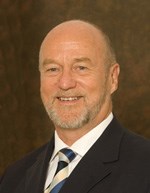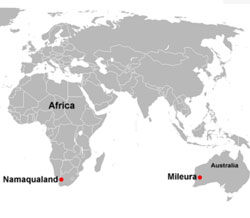Science and Technology Minister Derek Hanekom says the Square Kilometre Array (SKA) will transform perceptions of Africa as the continent is not usually seen as a location for cutting edge science and technology.

Artist's impression of the 15m x 12m Offset Gregorian Antennas within the central core of the Square Kilometre Array. (Source: Swinburne Astronomy Productions for SKA Project Development Office; author: SKA Project Development Office and Swinburne Astronomy Productions; via Wikimedia)
"With SKA, things will definitely change. Africa will no longer be the receiver but a major contributor to technology and hopefully young scientist in the continent will benefit," Hanekom said on Wednesday
The minister was speaking to the media after the first Ministerial Meeting of the SKA African Partner Countries - Ghana, Madagascar, Botswana, Namibia, Zambia, Mozambique, Mauritius and Kenya in Pretoria. The meeting is ahead of the first MeerKAT antenna launch in Carnarvon, in the Karoo tomorrow.
Phase 1 of the SKA will be co-hosted by South Africa and Australia, while the Phase 2 will see the eight countries partnering.
The meeting saw the nine countries signing the readiness strategy and joint implementation plan for SKA, which stipulates time resources, funds and human capital in each country by 2015.
"We encourage each partner country to work towards establishing relevant human capital development programmes and instruments aimed at building a new pipeline of researchers, scientists and engineers, technical skills and expertise for the successful implementation and sustainability of the SKA and other radio-astronomy programmes and initiatives," reads a communiqué issued after the meeting.

(Image: GCIS)
They also plan on mobilising funding and technical resources needed to realise Africa's vision for radio astronomy, while facilitating partnerships globally - as countries were not at the same level of readiness for the project.
To ensure the wheels keep turning - Minister Hanekom said South Africa is already providing training for seven Ghanaians, who will operate and maintain the soon-to-be radio telescope at Kutunse in Ghana. It is hoped that more people from all partner countries would be trained in the next few years.
From other parts of the continent, the minister said, 90 students from other African countries had been trained in South Africa.
In addition, he noted that the development of radio astronomy in Africa was also being supported by the European Union, through the Africa Europe Radio Astronomy Programme.
AVN project
Part of this readiness is the African Very Long Baseline Interferometry Network (AVN) project. The project involves converting surplus large telecommunications dishes in the partner countries into radio telescopes.
The ministers highlighted that the AVN project would develop infrastructure relevant to the SKA and start world-class radio astronomy in the African countries concerned.
The African Renaissance Fund has allocated R120m to support the development of the AVN, and the South African Department of Science and Technology has added another R21m.
The SKA, which will be hosted by Australia and New Zealand, as well as SA and eight other African countries, will be a mega telescope, about 100 times more sensitive than the biggest existing radio telescope.
It will include thousands of antennas, scattered across 3,000km in both southern Africa and Australia. Construction of the first two phases is expected to begin in 2017 and conclude in 2024, at an estimated cost to member countries of €1.5bn.





























